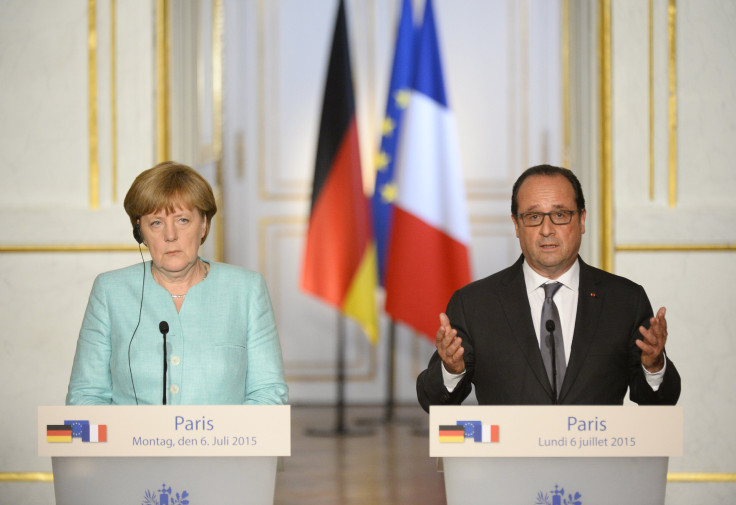Greece Debt Crisis: Eurozone Leaders Speak Out About Grexit Ahead Of Brussels Meeting

The eurozone's latest emergency meeting to discuss Greece's financial crisis started Tuesday, but some countries' leaders had already made up their minds about what they thought should happen. Among the most outspoken were German Chancellor Angela Merkel and French President François Hollande, who gave a joint news conference Monday encouraging Greece to propose a way forward after its public rejected the austerity measures accompanying the European Union's bailout, the Independent reported.
"We must respect the vote of the Greek people, but we must also respect the other 18 member states. That's a matter of democracy," Merkel said. Here's what some members of other eurozone nations have recently said about Greece:
Austria -- Finance Minister Hans Jörg Schelling told Reuters last week that the Grexit was "almost inevitable," according to previous International Business Times reporting. On Saturday, he elaborated: "A new aid program needs to be started. The old one is dead and can't be extended. And a new aid program takes time. In addition, there can be no new lending without conditions," Schelling told Die Presse of Vienna.
Belgium -- Foreign Minister Didier Reynders told RTL Belgium Radio he was worried about the effects of a Grexit. "I'm afraid that it could have geopolitical consequences in the region. We must not forget that the Greek influence in the Balkans is very significant, as it is one of the key investors in the region. The consequences can affect not only the Former Yugoslav Republic of Macedonia and Montenegro, but also … Bulgaria, if we consider difficulties in stabilizing this area," Sputnik reported he said.
Estonia -- President Toomas Hendrik tweeted Monday that "Greece's creditors [are] NOT just banks," adding that eurozone countries poorer than Greece could lose up to 4.2 percent of their gross domestic product.
Finland -- Finance Minister Alexander Stubb has said about a tenth of Finland's annual budget is at risk. The country lent Greece about 5 billion euros, "so obviously a lot is at stake," the Associated Press reported he said. "We need to see some political will, a change of attitude on the part of the Greek government in order for this to work."
Ireland -- Finance Minister Michael Noonan told the Irish Times he wants Greece to stay in the eurozone and is prepared to negotiate to make that happen. "I have said here on several occasions that the Greek government should follow the example of the approach we took in Ireland and restructure the debt," he said Tuesday. "There are several options on reprofiling and restructuring debt. ... I am prepared to look at the Greek proposals."
Italy -- Foreign Minister Paolo Gentiloni said Tuesday he wanted to try to come to an agreement with Greece because a new scenario would be "full of risks." "There are not only cultural reasons, sentimental, historical, but also strong geopolitical arguments" for keeping Greece in the eurozone, he said. "The prospect of a so-called Grexit can not be assessed only from the accounting point of view, but also from a strategic international alliances position in the Mediterranean."
Lithuania -- President Dalia Grybauskaite accused the Greek government of lying to its people so they would vote "No" on Sunday's referendum. This "agitated [them] to vote against reforms which are necessary to stabilize the financial situation," Politico reported she said.
Luxembourg -- Prime Minister Xavier Bettel told Reuters Sunday he was confident the EU could find a solution, providing Greece explains "how it sees the way forward, respecting European procedures."
Malta -- Prime Minister Joseph Muscat told Reuters that countries that had lent money to Greece, including his own, needed to consider their own futures. "The Greek government sought to protect its people's interest using the method it deemed best. People in creditor countries now expect their representatives to protect their interests and that of the whole European project," he added.
The Netherlands -- Prime Minister Mark Rutte said it was "over" if Greece didn't put forth a proposal soon. "If things stay the way they are, then we're at an impasse," he told Reuters. "There is no other choice; they must be ready to accept deep reforms."
Portugal -- Deputy Prime Minister Paulo Portas said Greek voters' opinions must be respected "to the same extent as the will of all the other eurozone states," but the nation must make a viable proposal.
Slovakia -- Prime Minister Robert Fico said Slovakia won't be hurt by Greece's choice, no matter what it is. "Slovaks will not lose one euro because of the Greeks, as we did not give any cash, only our guarantees," he told Agence France Presse.
Spain -- Prime Minister Mariano Rajoy told the Guardian Spain was "absolutely not contemplating a Greek exit from the euro." Not reaching a deal will hurt Greece the most, he said. "Spain will be flexible, but Greece must meet its commitments. If everyone does as they wish, things cannot work," Rajoy added. "I hope we arrive at an understanding. The Greek government has taken steps in the right direction ... but we all need to make an effort to reach a deal, it is better for Greek citizens, for Greece and for the rest of the Union."
© Copyright IBTimes 2024. All rights reserved.





















